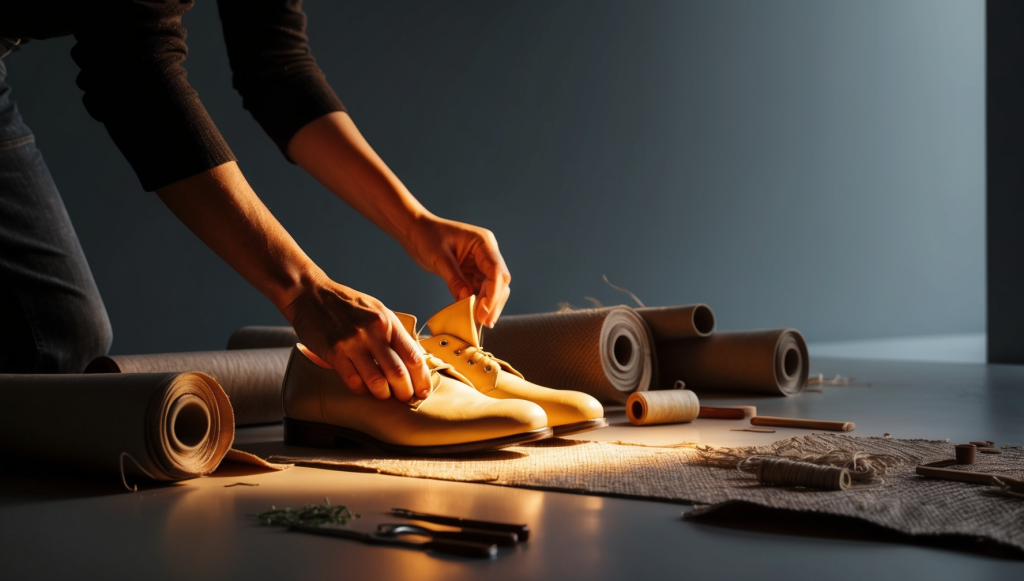As the demand for ethical and sustainable fashion grows, more and more people are turning to vegan shoes as an alternative to traditional leather footwear. But what exactly makes shoes vegan? How are these shoes made, and what materials are used to replace animal-based products? In this article, we’ll explore what defines vegan shoes and how they are crafted.
How Can Shoes Be Vegan?
The term “vegan shoes” refers to footwear that is entirely free of animal-derived materials. This includes not only the outer material but also the lining, adhesives, and other components typically found in traditional shoes.
The key concept behind vegan shoes is the absence of animal products such as leather, suede, and wool. In place of these materials, vegan shoe manufacturers use synthetic or plant-based alternatives that do not involve any animal exploitation. For example, traditional leather is replaced with synthetic leather made from plastic-based materials or natural alternatives like cork, mushroom leather, or pineapple fibers.
Vegan shoes are also free from other animal-derived substances commonly used in shoes, such as:
- Animal-based glues: Some traditional shoes use animal-derived glues made from collagen and other animal parts, but vegan shoes use plant-based or synthetic alternatives.
- Wool or silk linings: Instead of wool or silk, vegan shoes often use synthetic fabrics, cotton, or recycled materials for lining and insoles.
- Rubber: Although rubber itself is naturally derived from trees, some conventional shoes may use rubber combined with animal-derived additives. Vegan shoes use 100% vegan rubber.
By using these cruelty-free alternatives, vegan shoes are a great choice for those who want to align their values with their purchasing decisions and reduce their environmental impact.
How Are Vegan Shoes Made?
Making vegan shoes involves using alternative materials and processes that are kinder to animals and the environment. The production of vegan shoes is similar to traditional footwear, but there are some key differences, particularly in the materials and methods used. Here’s a look at the general process:
- Material Selection:
Vegan shoes start with the selection of ethical and sustainable materials. Some popular options include:
- Synthetic Leather: Vegan leather, made from polyurethane (PU) or thermoplastic polyurethane (TPU), mimics the look and feel of animal leather but is made from plastic. It’s often used in vegan shoes as an alternative to traditional leather.
- Cork: Cork is a natural and renewable material harvested from cork oak trees. It is lightweight, flexible, and used in some eco-friendly vegan shoes.
- Mushroom Leather: Known as “mycelium leather,” this material is made from fungi and is gaining popularity in the fashion industry as a cruelty-free, biodegradable option.
- Piñatex: Made from the fibers of pineapple leaves, Piñatex is a sustainable material used for shoes, offering durability and a unique texture.
- Recycled Fabrics: Many vegan shoes use fabrics made from recycled plastics, such as PET (polyethylene terephthalate) bottles, or organic cotton, which are both environmentally friendly alternatives.
- Design and Patterning:
Just like traditional shoes, vegan shoes start with a design. Footwear designers create patterns based on the shoe’s desired shape, size, and functionality. In the case of vegan shoes, designers ensure that the chosen materials are appropriate for the shoe’s style and purpose. - Cutting the Materials:
Once the patterns are ready, the materials are cut into the necessary shapes. This includes cutting the upper part of the shoe, the lining, insoles, and soles. Precision is key to ensuring the proper fit and design. - Sewing and Assembly:
After the materials are cut, the pieces are stitched or glued together. Vegan shoes may use plant-based adhesives instead of animal-derived glues. The stitching can be done using high-quality, durable threads, often made from synthetic or recycled materials, to hold the shoe’s components in place. - Adding Soles:
The soles of vegan shoes can be made from various materials. Rubber is a common option, and many vegan shoe brands use 100% vegan rubber instead of rubber mixed with animal-derived components. Some shoes also feature eco-friendly soles made from cork or recycled rubber. - Finishing Touches:
The shoes are then finished with details like laces, zippers, eyelets, and any decorative elements. These materials are also selected to be free of animal products. Vegan shoes often use cotton, hemp, or other synthetic alternatives for laces and trims. - Quality Control:
Finally, the shoes undergo a quality control process to ensure they meet standards for durability, comfort, and aesthetics. This step ensures that the shoes are ready for wear and meet the expectations of customers who are looking for a product that is both stylish and ethically made.
Materials Used in Vegan Shoes
There are a wide variety of materials that can be used to make vegan shoes, each offering different properties in terms of comfort, durability, and sustainability. Here are some of the most common materials used in vegan footwear:
- PU Leather: Polyurethane leather is one of the most popular alternatives to traditional leather. It’s durable, easy to clean, and comes in a variety of colors and textures.
- Recycled Materials: Some vegan shoes are made using recycled plastics, rubber, and other materials to minimize environmental impact. This approach helps reduce waste and promotes sustainability.
- Natural Materials: Many vegan shoes are made from renewable, natural materials such as cork, hemp, and organic cotton, which are biodegradable and have a lower environmental footprint.
- Mushroom Leather: As mentioned earlier, mushroom leather is a revolutionary material made from the root structure of fungi. It’s biodegradable and can be used to create shoes with the appearance and feel of traditional leather.
- Pineapple Leather: Piñatex is a sustainable material derived from the fibers of pineapple leaves. It is durable, lightweight, and provides a unique texture that mimics leather.

Vegan shoes are a fantastic way to align your footwear choices with your ethical values and environmental concerns. They are made without the use of animal products, relying instead on cruelty-free, sustainable materials like synthetic leather, cork, mushroom leather, and recycled fabrics. The manufacturing process for vegan shoes is similar to that of traditional shoes, but with a greater focus on materials that are kinder to animals and the planet.
Whether you’re looking for stylish sneakers, durable boots, or eco-friendly dress shoes, there’s a wide variety of vegan footwear options available, offering the perfect combination of comfort, quality, and ethical craftsmanship.












